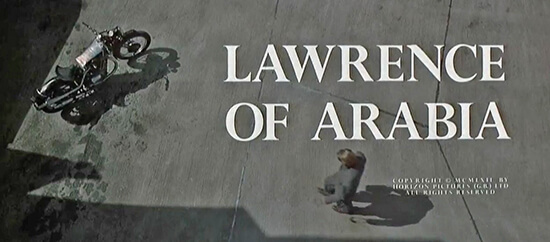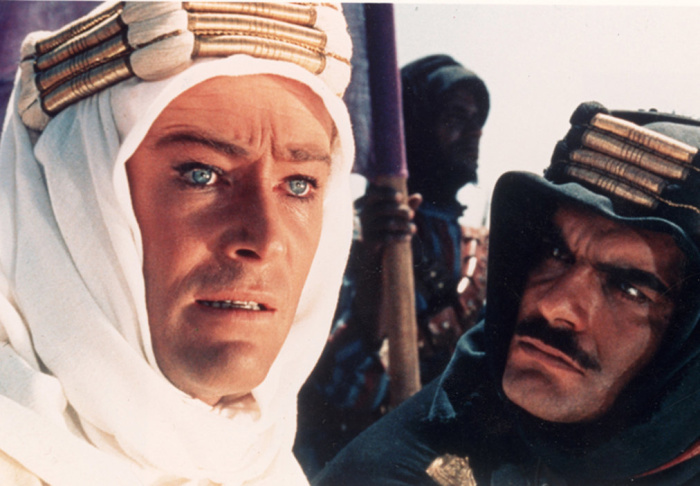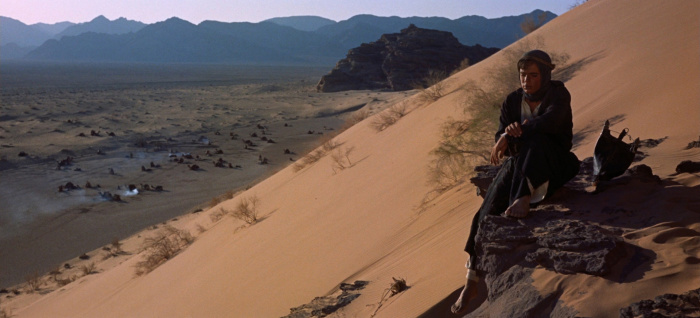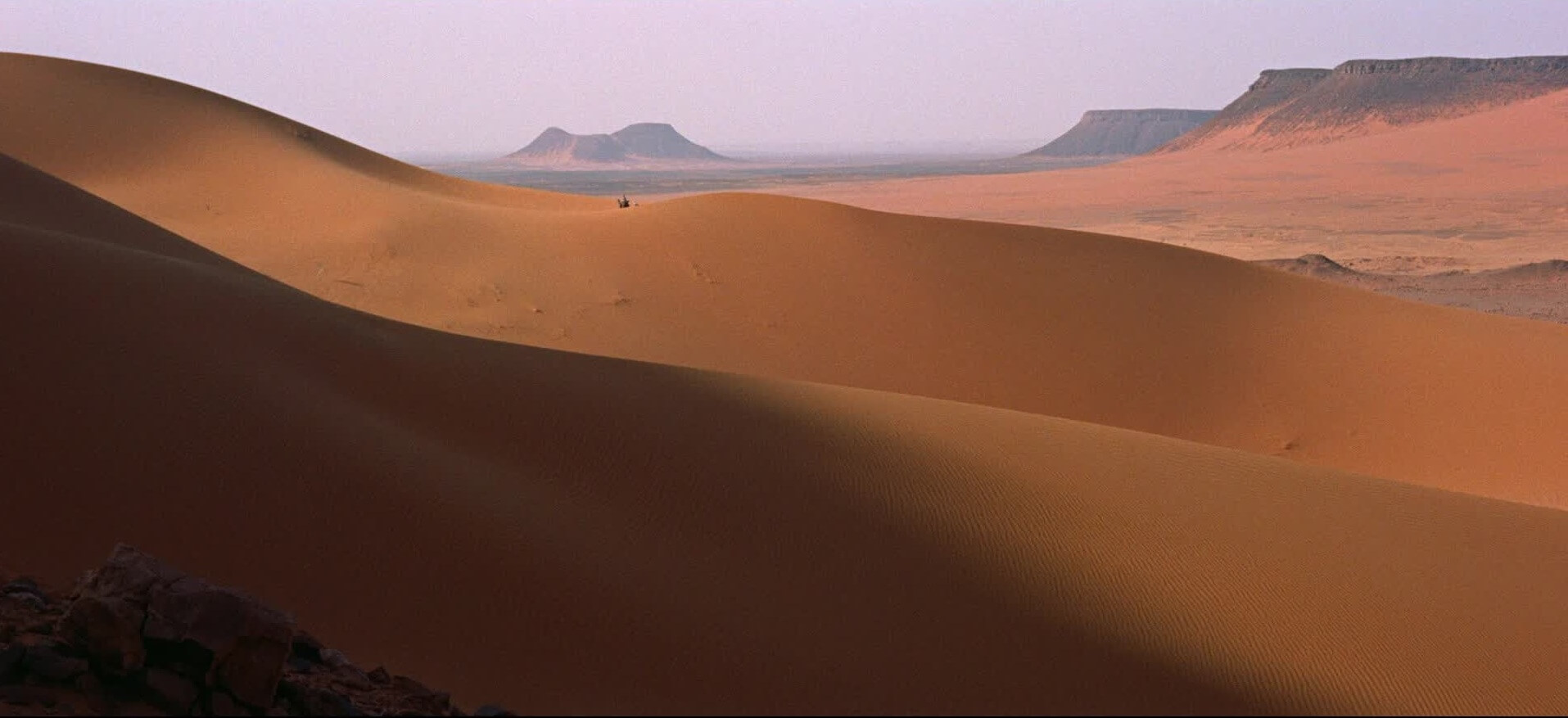I recently had a chance to watch the restored version of the 1962 film Lawrence of Arabia, the epic film starring Peter O’Toole and Omar Sharif that tells the story of the like of TE Lawrence. It’s a film with solid place in the canon of Western culture, but I’d never seen it nor discussed it with any friends. Seeing as I had some time over the holidays, I decided to watch the film myself.
While I was put off by length of the film (close to 4 hours), and subject matter, which didn’t particularly appeal to be in the abstract, I’m glad that I got past my trepidation. It’s been a film that left quite as lasting impression and I’ve often thought of it since. TL;DR go find this movie and watch it. Though not without its faults, it has a rightfully earned place as a classic and should be viewed post haste.

The Good
Right from the opening shot, it was clear that this would be a visually stunning movie. The first scene, which is actually the end of Lawrence’s life, opens with a high shot of a concrete drive with a motorcycle and some angular shadows. As the opening credits fade, we catch our first glimpse of O’Toole walking towards the bike. It’s just the first shot in a movie that is a master class in composition.
Within twenty minutes of this scene, Lawrence is traveling through the desert with a Bedouin guide. While much of the shots to this point were clearly done on a sound stage, the desert shots were done on location. Here, in addition to exceptional composition, the director brings us through an amazing landscape that is painted with a rich, earthy palette. These scenes?—?as Lawrence travels through the desert?—?are often the most breathtaking in the whole film. The severity of the landscape is echoed in many of the Arab characters, but often stands in stark contrast to the portrayal of Lawrence. I can’t overstate how beautiful this film is to look it.
Even though a solid half-to-two-thirds of the movie is set out of doors, the remainder that is set on a stage is crafted with an equal amount of attention to detail and composition. This richness of detail is also present in the costumes, which appear appropriate and visually interesting without becoming overly flashy.
Despite early reservations about the length of the film, the pacing was quite brisk. While certainly not hectic, the story has an engaging rhythm that balances action and battle scenes with travel and character development. I broke the viewing of the movie up into two sessions, simply for practical reasons, but I could have easily sat through the duration and not been bored. It is absolutely a testament to the screenwriter that such a broad story could be told in a manner that remains engrossing from start to finish.

While there are doubtless other strengths, that last one that I want to mention here is that of the characters. O’Toole absolutely inhabits the role of Lawrence, depicting him as a deeply passionate individual who is not without his own demons.
This version of Lawrence is quickly painted as slightly off, and shown to be separate from his countrymen in his empathy for the Arab cause and affinity for the desert landscape. He is strong and resilient, while at same time profoundly human and vulnerable. This version of TE Lawrence is, of course, fictionalized, but shares many of his reported traits and affectations. One particularly admirable quality is his compassionate treatment of the Arab characters throughout the film. Unlike other British officers, he treats them with respect and dignity. He treats them as human beings, and acknowledges his place as an outsider while at the same time attempting to understand their way of life.
And with a few exceptions, the Arab characters of various tribes are depicted as dimensional humans, with passions, strengths, and failings of their own. I imagine that this would stand in contrast with many period depictions of Arabs, and indeed, many contemporary representations as well.
The Not-So-Good
While the films characters are one of its main strengths, they are also one of its main failings. Given that the film is based on and is a representation of actual events and people, troubles arise when liberties are taken with history. In the film, Sherif Ali is one of the main characters, yet he was not an actual person. Believed to be an amalgam of several actual people, his character is a substantial invention. Another example is the portrayal of Howeitat leader Awda abu Tayeh in the film, who is depicted?—?by Anthony Quinn no less?—?as a money-obsessed, self-serving pirate. In contrasts, Lawrence’s own writings about him extol his nobility and strength.

Perhaps more troubling than historical inaccuracies is the elevation of the importance of role that Lawrence played in the Arab Revolt. In the film, Lawrence is shown as the driving central force behind the Revolt. He is shown as the only British officer willing to work with the Arabs, who would be hapless without him. While Lawrence undoubtedly played a part, he was one among a handful of other British officers who operated in similar capacities.
The near-religious status that the film attributes to Lawrence is also troubling. While he is depicted with more nuance than characters in Dances With Wolves or Avatar, the film shares a similar trope of the White savior who organizes the savages that would be damned without him. It’s a troubling framework for the story, despite its derivation from recorded history.
Influence
Of note is the fact that Lawrence of Arabia left a definite impression on filmmakers that would follow, most notably George Lucas. I watched it at the height of Star Wars mania, and couldn’t help but be reminded of the sands of Tatooine as Lawrence traversed the deserts of Jordan. The light, the color, the framing, and even Alec Guinness, are all things that Lucas most certainly lifted from this film.
Though not without its faults, I highly recommend Lawrence of Arabia. If you have the opportunity to see it, don’t hesitate. After you watch it, I’d be interested to hear what you think.

No Comments.